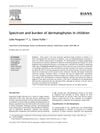 43 citations,
August 2013 in “Pediatric Dermatology”
43 citations,
August 2013 in “Pediatric Dermatology” Trichoscopy is good for diagnosing and monitoring hair and scalp problems in children but needs more research for certain conditions.
 245 citations,
March 2012 in “Journal of The American Academy of Dermatology”
245 citations,
March 2012 in “Journal of The American Academy of Dermatology” Dermatoscopy is useful for identifying different hair and scalp conditions and can reduce the need for biopsies.
 October 2024 in “International Journal of Pharmaceutical Sciences Review and Research”
October 2024 in “International Journal of Pharmaceutical Sciences Review and Research” A 5% minoxidil spray could effectively treat male baldness with fewer side effects and better patient comfort.
 6 citations,
October 2015 in “International Journal of Women's Dermatology”
6 citations,
October 2015 in “International Journal of Women's Dermatology” Hair aging is inevitable, but using the right hair care products can help maintain hair health.
 30 citations,
May 2004 in “Journal der Deutschen Dermatologischen Gesellschaft”
30 citations,
May 2004 in “Journal der Deutschen Dermatologischen Gesellschaft” The document concludes that early diagnosis and treatment are crucial for children with hair loss to prevent permanent damage, although not all conditions can be effectively treated.

Different hair and nail conditions can indicate health issues and have specific treatments; accurate diagnosis is crucial before treatment.
 98 citations,
November 2002 in “Contact Dermatitis”
98 citations,
November 2002 in “Contact Dermatitis” Many people had severe allergic reactions to a common hair dye ingredient, causing them to seek medical care and miss work.
 16 citations,
July 2002 in “Australasian Journal of Dermatology”
16 citations,
July 2002 in “Australasian Journal of Dermatology” A woman with lupus experienced skin death due to a blood clotting disorder after stopping a blood thinner, which healed with treatment.
 4 citations,
November 2020 in “Psoriasis : Targets and Therapy”
4 citations,
November 2020 in “Psoriasis : Targets and Therapy” The document concludes that proper treatment and management of plaque psoriasis in adolescents can improve their quality of life.
 73 citations,
March 2009 in “Seminars in Cutaneous Medicine and Surgery”
73 citations,
March 2009 in “Seminars in Cutaneous Medicine and Surgery” The document concludes that accurate diagnosis of hair disorders is crucial and requires a range of diagnostic methods.
 21 citations,
May 1996 in “Current problems in dermatology”
21 citations,
May 1996 in “Current problems in dermatology” Detailed patient history and physical exams are crucial for diagnosing hair loss.
 35 citations,
January 1993 in “International Journal of Dermatology”
35 citations,
January 1993 in “International Journal of Dermatology” People with HIV and low T cell counts have more hair and scalp problems.
 30 citations,
November 2008 in “Facial Plastic Surgery”
30 citations,
November 2008 in “Facial Plastic Surgery” The conclusion is that the best approach for treating Female Pattern Hair Loss is a combination of different treatments.
 126 citations,
January 1987 in “Journal of The American Academy of Dermatology”
126 citations,
January 1987 in “Journal of The American Academy of Dermatology” The document concludes that understanding hair structure is key to diagnosing hair abnormalities and recommends gentle hair care for management.
 3 citations,
February 2008 in “Basic and clinical dermatology”
3 citations,
February 2008 in “Basic and clinical dermatology” Telogen Effluvium is a hair loss condition where treatment involves identifying and managing its triggers.
 81 citations,
March 2009 in “Seminars in Cutaneous Medicine and Surgery”
81 citations,
March 2009 in “Seminars in Cutaneous Medicine and Surgery” Effective hair loss treatment in women requires correct diagnosis and can include medications like minoxidil, antiandrogens, and treatments for underlying conditions like PCOS.
 8 citations,
March 1979 in “International Journal of Dermatology”
8 citations,
March 1979 in “International Journal of Dermatology” Dr. Vera H. Price's 1979 work emphasizes the importance of accurate diagnosis and personalized treatment for hair loss.
 November 1966 in “British Journal of Dermatology”
November 1966 in “British Journal of Dermatology” The meeting discussed various skin conditions, treatments, and unusual cases, highlighting the effectiveness of tetracycline in treating rosacea.
 1 citations,
July 2023 in “Journal of Clinical Medicine”
1 citations,
July 2023 in “Journal of Clinical Medicine” Different causes of beard hair loss have various treatments, including medications, lifestyle changes, and procedures to stimulate hair growth.
 67 citations,
January 2013 in “Indian Journal of Dermatology, Venereology and Leprology”
67 citations,
January 2013 in “Indian Journal of Dermatology, Venereology and Leprology” The document concludes that alopecia areata is an autoimmune disease without a definitive cure, but treatments like corticosteroids are commonly used.
 203 citations,
December 2004 in “Journal of The American Academy of Dermatology”
203 citations,
December 2004 in “Journal of The American Academy of Dermatology” Early diagnosis and treatment, using finasteride, minoxidil, or hair transplantation, improves hair loss outcomes.
1 citations,
November 2005 in “PubMed” Itraconazole effectively treats scalp fungus, with continuous use more effective than pulse therapy.
 20 citations,
March 2017 in “Journal of cutaneous pathology”
20 citations,
March 2017 in “Journal of cutaneous pathology” Shrinking of oil glands in the skin is a key sign of hair loss linked to TNF inhibitor drugs and may improve if the treatment is stopped.
 20 citations,
October 2013 in “British Journal of Dermatology”
20 citations,
October 2013 in “British Journal of Dermatology” The document concludes that clinicians should be aware of common hair and scalp disorders in women of African descent and that more research is needed to develop effective treatments.
 20 citations,
July 2008 in “Dermatologic Therapy”
20 citations,
July 2008 in “Dermatologic Therapy” The document says that treating the root cause of hair follicle damage is crucial to prevent permanent hair loss, and treatment options vary.
 21 citations,
February 2009 in “Journal of the American Academy of Dermatology”
21 citations,
February 2009 in “Journal of the American Academy of Dermatology” Some cases of tinea capitis, a fungal scalp infection, can look like scarring hair loss due to the body's immune response and the fungus itself.
 104 citations,
March 1987 in “Journal of The American Academy of Dermatology”
104 citations,
March 1987 in “Journal of The American Academy of Dermatology” Minoxidil helps hair growth in 63.6% of alopecia patients, with 27.3% having excellent results.
 June 2024 in “Nature Cell and Science”
June 2024 in “Nature Cell and Science” The Scalp Coverage Scoring method reliably measures hair density from images.
 November 2022 in “JAAD case reports”
November 2022 in “JAAD case reports” The text talks about a rare skin condition causing hair loss and suggests that people with this should also check their lung and heart health.
 32 citations,
June 2017 in “Journal of infection/The Journal of infection”
32 citations,
June 2017 in “Journal of infection/The Journal of infection” The document concludes that terbinafine is effective for treating scalp fungal infections in children and recommends not excluding them from school during treatment, while also highlighting the need for updated treatment guidelines due to changing infection patterns.





























